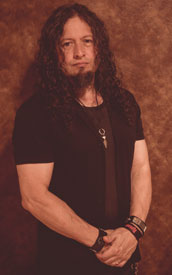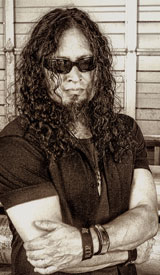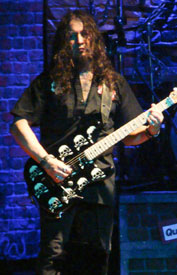|
Interview conducted August 12 2015 Interview published September 19 2015 |
"I would rather listen to a CD that I didn't quite get the first time…"
The progressive metallers Queensrÿche release their new album, Condition Hüman, on October 2nd and this album also marks their second effort without their former vocalist Geoff Tate and consequently their second with new vocalist Todd La Torre. Metal Covenant talked to original member and guitarist Michael Wilton to take a closer look at the album's direction and of course I just had to ask him a little bit about the singer swap as well.
"It was inevitable that change was gonna happen."
![]()
Tobbe: Is it relieving to be involved, to a far greater extent, in the songwriting process nowadays than what you were when Geoff was still in the band?
Michael: Oh yeah. You know, everything is open to anybody in the band, to write music and to be as creative as they want. There will be no creativity stifled in this situation. So yeah, it's really great that you have everybody contributing to the songwriting process and that just adds so much to the building and layering of the songs and, you know, they are just what they are. We're just in a great situation right now and there's not so many distractions anymore. We're really just focused on touring and making music and just making people aware of Queensrÿche.
 Tobbe:
Did you listen just a little bit to the older records before you started
the songwriting process?
Tobbe:
Did you listen just a little bit to the older records before you started
the songwriting process?
Michael: Yes, of course. You know, we are the 3 guys that started this whole thing 30+ years ago, so our DNA is imprinted in this and it's just a matter of rekindling that creative spirit and getting out of a cookie cutter pop format arrangement situation. Sure, we listened to some of the older albums and just, you know, got the spirit of those albums and kind of pushed us in that way of being a little free in the creative process. Back then we were writing as a band and now, in this day and age, we're writing as a band again, so we wanna capture that energy again.
Tobbe: Is there something with this record that you have intentionally changed musically from your last record?
Michael: You know, change is something that Queensrÿche has always done. We've always evolved from each album and we wanted to bring that back into this album. We didn't wanna do a carbon copy of the last album. We greatly respect that last album, but this one is a different album and we needed to move in a different direction, you know. Everything was set in place and we got the right producer [Michael "Zuess" Harris] for this body of music and we just decided to really, you know, write this music and create the depths in the music and just have the musical freedom in the arrangements and really just take it in a different direction. You know, in non-traditional directions to not be so normal.
Tobbe: As a whole I think that the last record was more made to sound like what you did up to the Empire album, whilst the new one is standing more on its own. It undoubtedly sounds like a Queensrÿche album though, but I think it's rather different from the last one.
Michael: Yeah, and that's important, because, you know, when we want people to listen to Queensrÿche, we want them to go "Oh yeah. That sounds like Queensrÿche guitar work." or "That sounds like Queensrÿche bass work." and we're meeting lots of people that frankly have not even cared about Queensrÿche since the Promised Land. So now there's a whole rebirth of Queensrÿche and a lot of popularity and they're checking it out. We want them to feel like "Okay. Yeah, this sounds like Queensrÿche. That Queensrÿche that I knew.".
Tobbe: Yeah, I remember them. But I think, once again in comparison to the last album, that Condition Hüman is kind of an album that takes more effort from the listener than what the last one did, because the last one was a little bit more catchy and this one needs a couple of additional spins to build its momentum.
Michael: Yeah, and as Operation: Mindcrime did, and as Rage For Order did, as The Warning did, and as Promised Land did. You know, it's just when you build the songs with so much depth and so much creativity, it's just a different animal, with different time changes, key changes, false endings, segues. You know, for me as a listener, I would rather listen to a CD that I didn't quite get the first time, that at each time I listen to it, I find something new about it that makes we wanna hear it again, and again, and again. And pretty soon you start grabbing your favorite songs and discovering these nuggets and layers and to me, those are the ones that I cherish the most. You know, when a song just hits me immediately, after the 3rd song I'm done with it and it's not as rewarding.
You know, like a Rush album or a Soundgarden album, it's like you get it the first time a little bit and the more you listen to it, you start discovering more and more things and you start discovering, you know "Hey! Song 8 is really cool too, besides song 1.". You know, that kind of thing and I've always loved that with hard rock, metal, progressive metal, progressive rock. You know, all that stuff. Yeah, it's a different animal.
Tobbe: What do you think that this new record can add to Queensrÿche's already nice catalogue of records?
Michael: I think for the listener of Condition Hüman, it's a good variety of songs, that are eclectic, that are progressive, that are hard rock, that are epic. I think there's a good diversity of everything, that's really intriguing. I mean, the last song on the album is almost 8 minutes long, so it shows that the band is taking chances again and not doing the industry standard.
Tobbe: How hard would it actually be to really recreate what you did in the past, in the 80's? If you really wanted to?
Michael: Well, you know, it's always fun to go back and listen to the way I played guitar back in my mid 20's, but, you know, I've progressed my musicianship to where I'm at right now. But I think it's more of the spirit of writing as a band and complementing the song and only putting in what the song needs or wants. That's what we used to do.
Tobbe: So nowadays, what inspires you?
Michael: What inspires me is just creative freedom now. It's not like I have to write a certain style or anything. I just go with the flow, you know, and for me, if I'm on the road and in adverse conditions and whatever, that's usually when some great ideas pop out. So then it's just a matter of getting those ideas documented. You know, as I get older, it's like if I don't get that recorded or anything, I'll probably forget it.
Tobbe: Your last album was kind of short. It was only 35 minutes to be exact, which I nevertheless quite often think is good though. This one is about 53 minutes and am I correct when I believe that you guys took this matter under consideration when you started to work on Condition Hüman?
Michael: Right, and I think that's inherent in the song arrangements, you know. It's like, it's not traditional. Instead of doing two choruses to end the song, "Let's just do one chorus, and let's develop a new part in there, and let's take it around the corner and add something else to it and make it special.". So the writing arrangement, I mean, it was "Let's just see where this can go.". It's hard to describe, you know, when you have that feeling that you've nailed something. It's just, everybody goes "Yeah!" and that's it.
 Tobbe:
When somebody looks back at this Queensrÿche album in the future,
what do you want them to see?
Tobbe:
When somebody looks back at this Queensrÿche album in the future,
what do you want them to see?
Michael: Well, I want them to say that the rebirth of Queensrÿche produced some great music and I want them to say that those were exciting times for the band. Will this record be timeless? I don't know. It's weird, because it's so personal to me. I have to go on what other people hear, you know, and other people with great ears, that I trust. But that's kind of what I would like.
Tobbe: Do you think that Queensrÿche eventually will be known for like 3 different time periods? You know, the classic one, and the second one when the band kind of was slowly torn apart, and a third one with what you are of today?
Michael: Right. I think it's the evolution of the band. We've been in it over 30 years and we've seen different variations of it and now we're pretty solidified in this. You know what it shows? It shows that the name, that the Queensrÿche name has become an entity. It is what it is and it will always be there. Queensrÿche has never been just about one person. It's been about the entity and I think the entity will live longer than we will.
Tobbe: So what about Todd's performance? Besides being a great vocalist, what has Todd actually brought to the table that wasn't there earlier?
Michael: Oh, well Todd's a musician, you know. He's an accomplished musician. He's a drummer. A very accomplished drummer. If he's hearing a drum beat, or maybe a hi-hat beat, you know, he can be descriptive and tell Scott [Rockenfield] "This is the kind of beat I was hearing in this song.". If he's talking to me and saying "This is the way I kind of wanted the guitar part to go in this song I'm writing and I'm looking for something a little more dominant seventh, you know, in the key of E-flat.". It's descriptive, you know, so it expedites the communication. He's on the same wavelength as everybody and just the communication is much faster, it's better described and thus, you know, it's more efficient.
Tobbe: You know, with his singing style, it takes a lot of effort to perform what he is doing live. Are you sometimes worried that his voice will break down during tours?
Michael: Obviously on this last stretch of shows, we did 21 shows in 23 days, we could see that Todd's voice and his health was starting to deteriorate just a little bit, but he managed to get through all the performances. This is no easy gig, singing these songs. We've been performing these songs, with Todd now, for a little over 2 years and he's become more confident, and he's more comfortable on stage, performing the songs, and his voice has just gotten stronger. I know we're not gonna put him in this kind of a situation again, because a voice does needs rest and we can't be doing 7 in a row's anymore.
 Tobbe:
You guys did, for a long time, hang on to what Geoff wanted to do, with
records and stuff. But for how long time had you been thinking of going
separate ways with him before you actually fired him?
Tobbe:
You guys did, for a long time, hang on to what Geoff wanted to do, with
records and stuff. But for how long time had you been thinking of going
separate ways with him before you actually fired him?
Michael: You know, it's just one thing just led to another and it just got to the point where nobody was seeing eye to eye, and music directions were all in the wrong way, and it was just time for a needed change. You know, you can't pinpoint exactly when things went wrong. It's something that gradually kept growing. You know, me being a hopeless optimist, always thinking "Well, I think it can get better. I think it's gonna get better.". The problem is that it never does. It was inevitable that change was gonna happen.
Tobbe: Did you have any kind of plan B, if things hadn't worked out with the singing swap and your fans had abandoned you?
Michael: No, I don't think that way. I only knew what the fans wanted and I only knew what I wanted and what Scott and Eddie [Jackson, bass] wanted, you know. If the fans hadn't been there to back us up and support us, yeah, I don't know what would have happened.
Tobbe: But isn't it a little bit funny, because I believe that like 99 percent of the people were on your side during this odd situation? Why was that, you think?
Michael: You know, there's just a lot of reasons. You can't just pinpoint any of it. Maybe the song selection. You know, the tours weren't satisfying to the fans. You know, just a lot of things. When they heard the energy and just the determination and the fire with Todd, I think just a light went on in everybody's head and "Wow! They're back!".
Tobbe: Things perhaps may have looked differently if you hadn't gotten such a great replacement as Todd is actually.
Michael: Yeah, I know. It's miraculous that I actually ran into him and met him.
![]() See
also: review
of the album Condition Hüman
See
also: review
of the album Condition Hüman
Related links:
www.queensrycheofficial.com
www.facebook.com/queensrycheofficial
![]()